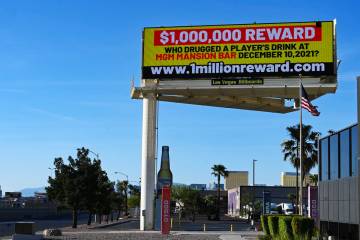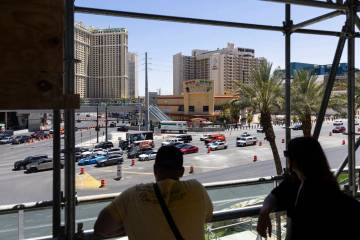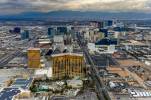Adelson asks to bar cameras from court because of ‘security threat’
Las Vegas Sands Chairman and CEO Sheldon Adelson wants a judge to bar cameras during his trip to the witness stand at a civil trial next week, saying that video and still images of his testimony would threaten his security.
To drive home the point, the billionaire on Friday brought in renowned Harvard University law professor Alan Dershowitz, to argue against cameras in the courtroom.
The famous lawyer has spent more than four decades arguing to open judicial proceedings to both television and still cameras, but in Adelson’s employ, he landed on the other side of that battle.
“Mr. Adelson is an extremely controversial figure, internationally not only because of the role he played in the current election but because of his very strong advocacy for Israel,” he said. Threats against him “have been getting worse and worse” in recent years according to members of his security staff, Dershowitz said.
His donations to the Republican party ran close to $150 million last year, including major support of presidential candidates Newt Gingrich and Mitt Romney.
Neither Dershowitz nor anyone in court would pinpoint any threat or say how having his image recorded in court would jeopardize Adelson’s safety.
To gauge the nature of the reputed threat, Clark County District Judge Rob Bare will interview Brian Nagel, Sands’ global head of security, in chambers on Monday. That session will be closed to the public, though lawyers representing media organizations will be allowed to attend, bound by confidentiality to keep secret what they hear.
In court papers, Sands said that having Nagel speak in public “concerning the precise nature of the threat and the types and methods of (Sands’) security operations would itself exacerbate the threat.”
Several local media outlets, including the Review-Journal, KLAS-TV, Channel 8, and KNTV-TV, Channel 13, have submitted standard applications to photograph or video tape Adelson’s appearance.
The commotion over coverage comes in the run-up to the retrial, due to start Wednesday, of one-time consultant Richard Suen’s claim that he should be paid for helping Sands gain its lucrative gaming concession in Macau. Five years ago a jury awarded him $60 million, with interest, but the verdict was overturned in 2010 by the Nevada Supreme Court.
To Don Campbell, the attorney representing the media outlets, Sands is merely recycling arguments made in previous cases, including the original Suen trial. In that one, he said, cameras were allowed with “absolutely no ramifications ... jeopardizing to any person”
Further, he said, there have been several recent examples where Adelson sought publicity with cameras along, including during last year’s campaign.
Campbell added, “This is the new excuse du jour of Mr. Adelson of his seeking to impose limitations on the press.”
By contrast, cameras would give the public a window on how Sands dealt with high government officials in both China and the United States, he told the court.
The company has been the subject of a Securities and Exchange Commission investigation launched in 2011 concerning the Foreign Corrupt Practices Act. Its annual report filed March 1 with the Securities and Exchange Commission noted that “there were likely violations of the books and record and internal controls provisions” of the act.
“This is a very, very important case from the public’s perspective, which we are seeking to protect,” Campbell said.
Dershowitz contended that extensive video presence could make it more difficult for Sands to get a fair trial.
But Suen attorney James Pisanelli countered that Adelson “has become a master at cultivating public opinion,” having filed eight defamation lawsuits in the past six years.
In addition to requests to photograph and tape Adelson on the stand, the Courtroom View Network has asked to have a camera in place for the entire trial, currently expected to last a month.
Bare raised several question about how the network would advertise the trial and how it might affect the rate structures because cameras in courtrooms by law are supposed to further public knowledge and not commercial interests.






























